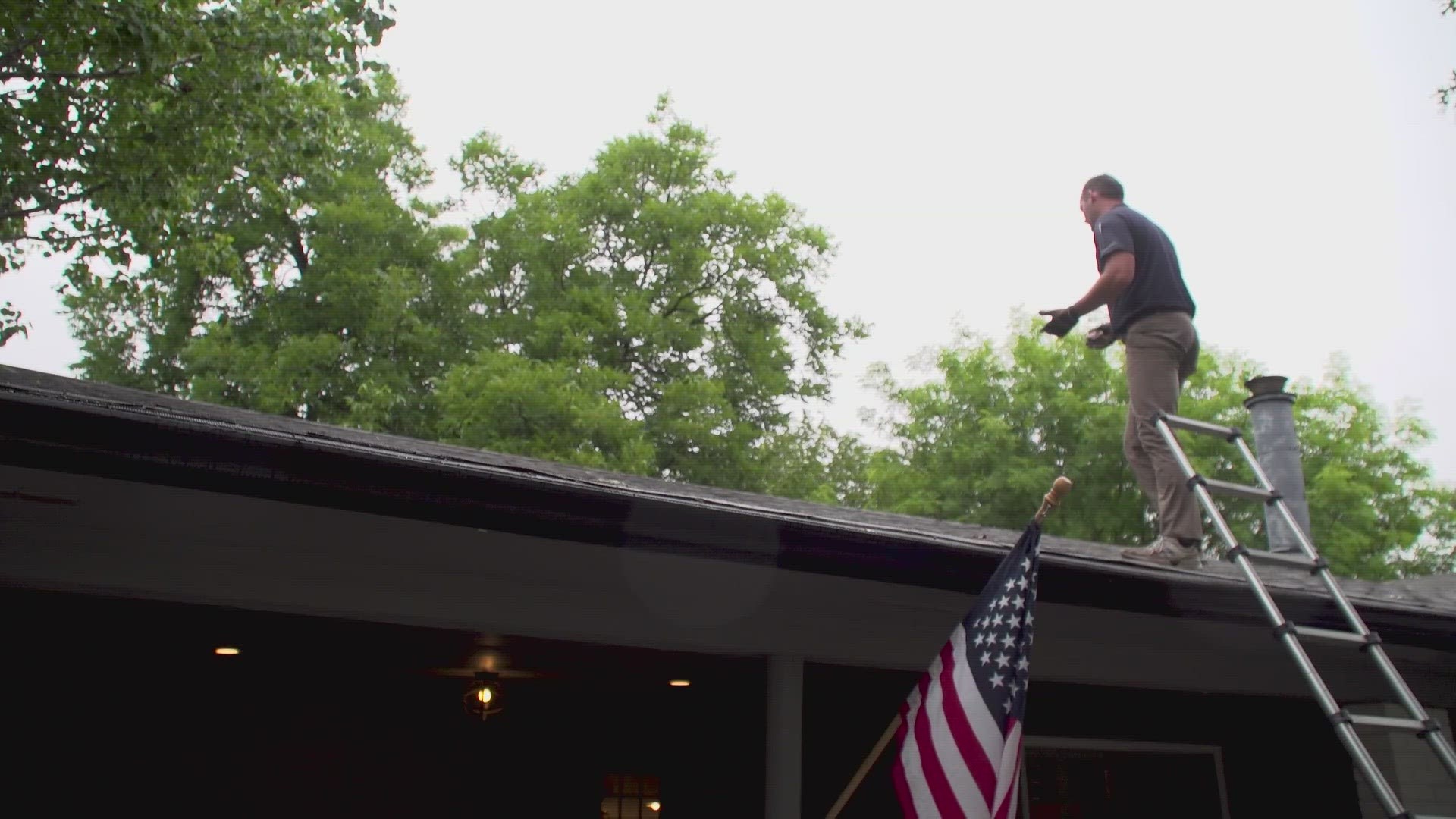ROCKWALL, Texas — Roofing companies are finding plenty of work this week after hail the size of baseballs pummeled shingles across Dallas-Fort Worth. And, many of them warn, be wary of extremely willing, but unlicensed, contractors offering a quick fix.
“The first thing I check, is I go across the whole roof,” said Eric Wimpee, of Firehouse Roofing, the top-rated roofing company offering roof inspection, repair and replacement in the DFW area for more than 26 years.
And the damage he showed WFAA Tuesday at a home in Rockwall was obvious. Cellphone video captured hail the size of quarters and golf balls.
Shredded and decapitated fresh leaves from an Oak tree littering the front yard are another indication of the intensity of the hail. Dents in rain gutters and other metal flashing and piping on the roof are tell-tale signs too.
“And I can tell this thing’s been demolished by the hail,” Wimpee said, while inspecting the rooftop vent for the home’s water heater.
He also found shingles lifted and loosened by the wind -- which is called zippering and can be a source of future leaks.
“The seal on them is starting to break,” he said. “And it’s something the next few rainstorms, it can rip these shingles off.”
On the roof, he circled with chalk more than a dozen heavy hail hits, which is enough to scar and indent the asphalt shingles.
“Every time it rains, there’s a little indentation in the shingle. Water will soak in there. And it will eventually get through that and come into the house," said Wimpee.
Enough, he said, for the homeowner to strongly consider filing an insurance claim for a new roof.
“With the shape of this roof with some of the zippering, it’s just a matter of time before until things get worse,” he said. “It needs to be replaced in my professional opinion, and he needs to get it addressed pretty quickly before he has leaks in the house causing him even more damage down the road.”
“Just make sure you get someone who’s licensed and insured to do roofing. And do your research. Look them up on the Better Business Bureau, look them up on google and do your own research,” he continued.
The Better Business Bureau also says beware of storm chasers who might not be local contractors. And the BBB offers the following advice as well:
- Contact your insurance company. Ask about your policy coverage and specific filing requirements. Save all receipts, including those for food, temporary lodging, or other expenses that may be covered under your policy. Your insurance company may also have recommended contractors.
- Beware of contractors claiming to waive deductibles. Claiming to waive insurance deductibles without the insurer's consent is illegal in Texas, according to House Bill No. 2102. If speaking with a contractor who offers to waive your deductible, reach out to your insurance company and check if they have been authorized to make that claim.
- Do your research. Find businesses you can trust on BBB.org. Check your local city government agency responsible for registering and/or licensing contractors. Get references from friends and relatives.
- Resist high-pressure sales. Some storm chasers use tactics such as the “good deal” you’ll get only if you hire the contractor on the spot. Be pro-active in selecting a contractor and not re-active to sales calls on the phone or door-to-door pitches. Disaster victims should never feel forced to make a hasty decision or to choose an unknown contractor.
- Be especially careful of door-to-door contractors. Many municipalities require a solicitation permit if sales people go door-to-door. Ask for identification. Check their vehicle for a business name, phone number, and license plates for your state.
- Don’t sign over insurance checks to contractors. Get an invoice from the contractor and pay them directly (preferably with a credit card, which offers additional fraud protection over other forms of payment). Don’t sign any documents that give the contractor any rights to your insurance claims. If you have questions, contact your insurance company or agent.
- Be wary regarding places you can’t see. While most contractors abide by the law, be careful allowing someone you do not know to inspect your roof and other areas of your house. An unethical contractor may actually create damage to get work. The same goes for attics, crawl spaces, ducts, and other places you cannot easily access or see for yourself.

